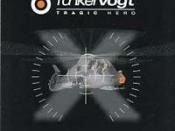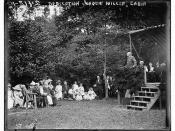According to Aristotle "a tragedy is defined as an imitation of action and life, not of an imitation of men"; but "is not merely an imitation of actions, but of events inspiring fear and pity" (Butcher). So he places a higher and more important role in the plot rather than the character. The plot, also known as the Mythos, is one of the main traits espoused by Aristotle in The Poetics that helps construct a tragedy. The plot consists of a hero going from joyfulness to ultimately misery due to his hamartia, or flaw. The quintessential Aristotelian hero has many good traits but his biggest trait , Hubris, which causes his downfall. The hero must be valorous, consistent, and honorable and come from royalty or aristocracy descent. An integral part of the plot is the use of anagnorisis, or recognition and peripeteia, or reversal fortune. At the end when the tragedy usually ends when the hero gives up his life in exchange for something he considers greater and leaves no further questions.
As portrayed by Aristotle's The Poetics, the tragic mode is archaic, "fit only for the very highly placed, the kings or the kingly" (Miller "Tragedy and the Common Man").
In contrast, in a modern tragedy "the common man is as apt a subject for tragedy in its highest sense as kings were" (Miller "Tragedy and the Common Man"). One did not need to be the aristocracy or royalty in order to be a hero. Arthur Millers views on the requisite characteristics of a modern tragedy are evinced in his essay "Tragedy and the Common Man". The "[Ones] who are without kings, took up this bright thread of [their] history and followed it to the only place it can possible lead in our time--the heart and spirit of...


